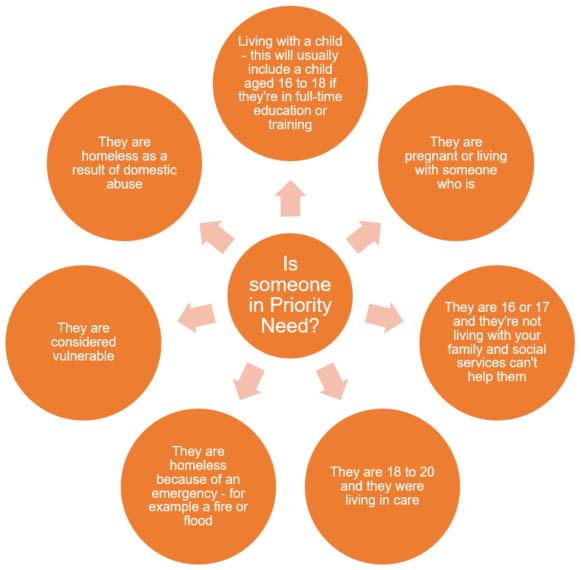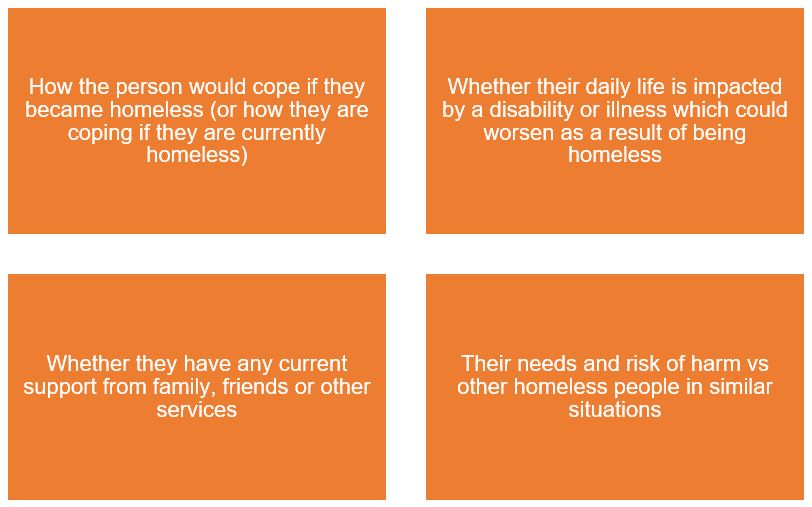Priority Need
Quick links
What is priority need?
Priority need is where certain people are given priority for access to accommodation over others -i.e. they are those that need access to accommodation the most. The relevant law on homelessness requires housing authorities to give priority to anyone that meets the definition of “priority need“.
What is the duty of a housing authority for individuals with priority need?
Housing authorities have a duty to try and prevent homelessness for all applicants who are eligible for assistance and are homeless or threatened with homelessness.
If housing authorities have a reason to believe that a person may be homeless, eligible for assistance and have a priority need, the law requires them to ensure accommodation is available for that individual. This duty exists under section 188 Housing Act 1996.
If a housing authority is unable to prevent someone from becoming homeless, or to help them secure accommodation within the initial relief stage, they are required to reach a decision as to whether they have a priority need for accommodation. If they do not find priority need, their duty ends.
A housing authority can’t change its decision once it has notified an individual they are in priority need and the review has been conducted e.g. if an individual had a child or dependent that subsequently leaves home.
How can a person be considered to be in "priority need"?
How can a person be considered to be in “priority need”?

What does it mean to be vulnerable?
A person is considered “vulnerable” if it would be significantly more difficult for them to cope with being homeless because of their needs when compared with an ordinary person, meaning they would likely suffer greater harm in the same situation. The following are examples of how a person might be considered vulnerable:
- because of a disability (physical disability, learning disability or mental health condition) or old age;
- because of violence threatened against them;
- due to having been a member of the navy, military or air force;
- due to having served a custodial sentence, been committed for contempt of court or having been remanded in custody;
- if they have a medical condition or illness that puts them at high risk from COVID-19 e.g. they are required to shield.
The assessment on whether someone falls within the definition of priority need will be carried out by the local authority that the individual applies to for either short term or long-term accommodation. The more information and evidence an individual can provide to the local authority as to why they are vulnerable, the better. This will increase the chance of an application being successful, as the approach taken by local authorities can vary massively.
A person could contact their GP, a social worker or other charities and homeless organisations who can support their application. They will need to provide reasons as to why being homeless will result in the individual’s vulnerability worsening and why they would be at greater risk.
The local authority will consider:

Any examples of vulnerability should be included in an application to make it more difficult for the local authority to justify a decision that would not support an individual being considered “vulnerable”.
Will someone have priority need as an ex-prisoner?
A person who spends time in prison may be considered vulnerable. When making this assessment, the council will contact agencies involved in the individual’s support and supervision. The council will consider the following:
- any support the person receives from friends and family;
- the number and length(s) of time they have spent in prison and when they were released;
- their physical and mental health and how this affects them; and
- whether they have been able to find or keep accommodation since being released.
An ex-prisoner will have an automatic priority need if they:
- have children who live with them;
- are pregnant or a partner they live with is pregnant; or
- are aged 18-20 and spent time in care when they were 16 or 17.
The Intentionally Homeless section provides examples of where the council may decide that an ex-prisoner is intentionally homeless and only entitled to limited support.
If someone is in priority need, does it mean their family are too?
- No, not necessarily. However, if an individual makes a homeless application, any members who are part of their household will be included in the application. The local authority can also decide whether anyone else could be included in the application.
- If a person is subject to immigration control, any household member who is a person from abroad who is ineligible for assistance is usually disregarded when determining whether the applicant has priority need.
- If a person has children but they do not normally live with them, then it is open to the local authority to decide whether it is reasonable for the children to reside with them.
How can someone access support or apply for priority need?
They must write a letter or an email to their local council/authority or housing association setting out that they are or will at some point in the near future be, homeless, explaining the reasons why they believe they are in priority need and require support/assistance.
What are the legal bits?
When writing to the council, an applicant must present themselves as homeless under section 183 of the Housing Act 1996. The Housing Act 1996 does not set out who the application must be made by – so if someone has the support of friends, family, a social worker, or a solicitor, it can also be made by them. Case workers can also help with this.
There is also a duty to refer individuals to local authorities by prisons, the Youth Offending Service, training centres, colleges, probation services, job centre, hospital, and social services. This is contained in paragraph 4.3 of the Code of Guidance.
What happens if someone disagrees with someone being in priority need/who can the applicant turn to for help?
If the council reject an individual’s application and disagree that they are in priority need, the individual can challenge their decision and ask for a review. Further detail on how to challenge their decision can be found in section 4. Details on how to access legal support can also be found in section 4.
However, any change of circumstance prior to the decision on the homelessness application should be taken into account. An applicant should submit further documents to support a change in circumstance if this is the case.
Case Study examples
Priority Need Case Study - Phil
- Phil has recently lost his job and cannot keep up with his rent payments. He faces eviction from his home in the next 5 weeks.
- Phil has no friends or family he can turn to for support and faces homelessness in 5 weeks’ time unless he can find any suitable accommodation.
- Phil also has autism and has recently had to shield due to COVID-19. He was advised by his doctor to do so because of his condition.
- If he is made homeless, Phil will become vulnerable as his autism will likely worsen and he will be at significant risk from COVID-19. Becoming homeless would likely put him at risk as his condition would mean he would become particularly distressed if he were to be made homeless.
- Given Phil’s disability, the impact homelessness would have on his disability and due to a lack of support he can rely on, Phil would therefore likely to be considered vulnerable and in priority need.
- Phil should contact his doctor to ask for documents he can use to support his application for accommodation.
Priority Need Case Study - Jasmine
- Jasmine is 18 and is currently homeless.
- She has spent the last few years in and out of care.
- Jasmine has some friends in the area but none of them are able to provide her with a place to stay. She has no family to turn to.
- Jasmine will therefore be considered to be in priority need.
Top tips section
- If you know someone might become homeless within the next 8 weeks, it is not too early to seek assistance.
- Advise clients to use the precedent letters in this toolkit when contacting the council.
- Advise clients to use the case studies in this section to see if any of the scenarios are similar to their situation.
